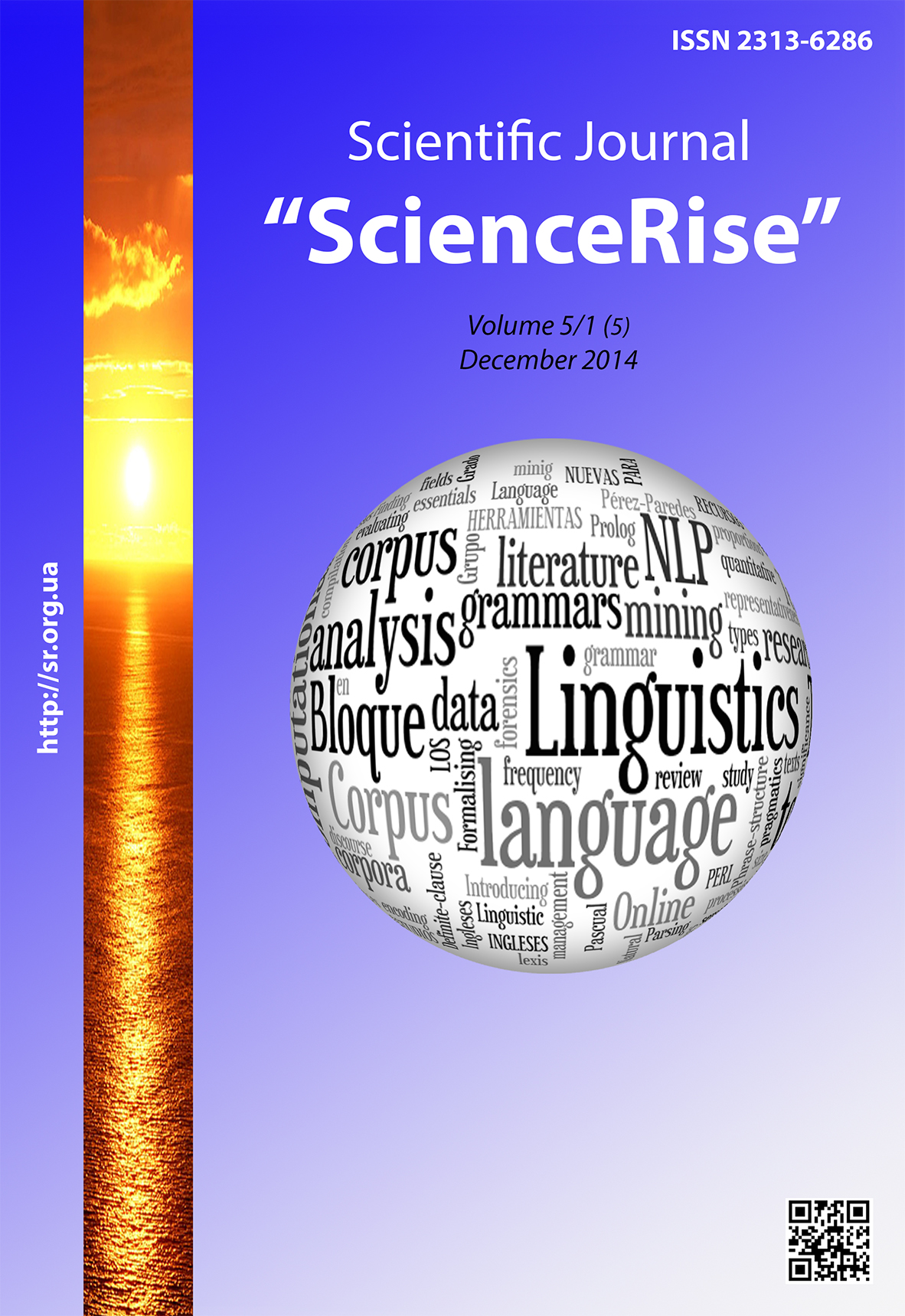Research methodology of social status of the rutenien (ukrainian) language in diachrony (ХIV–ХVII centuries)
DOI:
https://doi.org/10.15587/2313-8416.2014.31496Keywords:
Rutenien (Ukrainian) Language, methodology, diachrony, Renaissance, Reformation, Counter-Reformation, Baroque, linguistic and ethnic (national) consciousness, social pressure, history of ideasAbstract
The object of the article is the research methodology of the social status of the Rutenien (Ukrainian) Language in diachrony (14-17 centuries) the basis of which is the principle of trinity of ideas, circumstances and time. The evolution of the Rutenien Language status was analyzed in the context of ideas of Renaissance, Reformation, Counter-Reformation and Baroque; in the period of ungoverned functioning and within the chronological periodization caused by the intralinguistic and extralinguistic circumstances.
References
Sobutskyi, М. А. (1991) Lingual and Cultural Consciousness of the West-European ‘Renaissances’ and Alternative Mentalities Dynamics. In: Philosophic and Sociological Thought, 101–112.
Spengler, O.; Garelin N. F. (Ed.) (1998). The Decline of the West: Outlines of a Morphology of World History. V. 1. Form and Actuality. Minsk: Popuri LLC, 688.
Le Goff, J. (2007). The Medieval Imagination. Essays. Translated from French by Iarema Kravets. Lviv: Litopys, 350.
Alekseev, А. А. (1986). Why Ancient Rus Had No Diglossy. In: Ancient Rus Literary Language. Leningrad: Publishing House of the Leningrad University, 3–11.
Tkachenko, O. (2004). Ukrainian Language and Lingual Life of the World. Кiev: Spalakh, 272.
Uspenskiy, B. А. (1983). Lingual Situation of Kievan Rus and Its Significance in the History of Russian Literary Language. Moscow: Publishing House of the Moscow University, 143.
Otwinowska, Barbara. (1974). Język – naród – kultura. Antecedencje i motywy renesansowej myśli o języku. Wrocław, 288.
‘Slavonic Grammar’ by Ivan Uzhevych (1970). Kyiv: Naukova Dumka, 111.
Tumanian, E. G. (1985). Language as a System of Sociolinguistic Systems. Moscow: Nauka, 246.
Isichenko, I. A. (2011). History of Ukrainian Literature: the Epoch of Baroque (ХVII–ХVIII с.). Textbook for Higher Education Students. Lviv – Kyiv – Kharkiv: Sviatohorets, 568.
Nimchuk, V. (1996). Confessional Issue and Ukrainian Language of the End of ХVI – Beginning of ХVII centuries. In: Union of Brest and Ukrainian Culture of ХVII century. Lviv: Institute of Church History of Lviv Theological Academy, 1–48.
Gellner, E. (2000). Nations and Nationalism. In: Nationalism: Anthology. Кiev: Smoloskyp, 292–310.
Anderson, B. (2001). Imagined Communities: Reflections on the Origin and Spread of Nationalism. Кiev: Krytyka, 271.
Chyzhevskyi, D. (1994). History of Ukrainian Literature from Its Beginnings to the Period of Realism. Ternopil: Present Small Private Enterprise, with Femina LLC, 480.
Chepiha, I. (1989). Concept of Literary Language of Old Ukrainian Scribes of the ХVI – First Half of ХVII c. In: Genres and Styles in the History of Ukrainian Literary Language. К.: Naukova Dumka, 79–93.
Bercoff, G. B.; Dovha, L., Iakovenko N. (Eds.) (2005). Renaissance Historiography Myths in Ukraine. In: Ukraine of ХVII Century: Society, Philosophy, Culture: Collection of Scientific Works in Tribute to the Memory of Professor Valeriia Mykhailivna Nichyk. Кiev: Krytyka, 421–435.
Vendryes, J. (2004). Language: A Linguistic Introduction to History. Translation from French, 3rd edition, stereotyped. Мoscow: Editorial URSS, 408.
Moser, M. (2008). Overview of the Ukrainian Language History of Middle Age. In: Additions to the Ukrainian Language History; General edition by Serhiy Vakulenko. Kharkiv: Kharkiv Historical-Philological Society, 40–54.
Pivtorak, H. P. (2005). State Language in Grand Duchy of Lithuania and Problem of Separation of Ukrainian and Belorusian Written Monuments. In: Movoznavstvo, 3–4, 80–84.
Ohienko, I. (1995). History of Ukrainian Literary Language. Кiev: Lybid, 293.
Nimchuk, V. V. (1990). Origin and Development of the Language of Ukrainian Ethnic Group. In: Ukrainian Ethnic Group. Outlines of Social-Economic and Ethnopolitical History. Kiev: Naukova Dumka, 191–234.
Nimchuk, V. V. (1997). Periodization as Ukrainian Language Genesis and History Research Direction. In: Movoznavstvo. 6, 3–14.
Bilodid, І. К. (Ed.) (1958). Course of Ukrainian Literary Language History (pre-October period). Publishing House of USSR Academy of Sciences, I, 595.
Zhovtobriukh, М. А., Rusanivskyi, V. М., Skliarenko, V. H. (1979). History of Ukrainian Language. Phonetics. Кiev, 372.
Pliushch, P. P. (1971). History of Ukrainian Literary Language. Textbook. Кiev: Vyshcha Shkola, 423.
Historical Grammar of Ukrainian Language: Textbook / О. P. Bezpalko and others (1962). 2nd edition, revised. Кiev: Radianska Shkola, 510.
Nimchuk, V. V. (1998). Periodization as Ukrainian Language Genesis and History Research Direction. In: Movoznavstvo,1, 3–12.
Horbach, O. (1993). Genesis of Ukrainian Language and Its Position Among Other Slavonic Languages. In: Collected Articles. III. History of Ukrainian Language. Munich: Ukrainian Free University, 5(4)–17(30).
Sheveliov, I.; Vakulenko, S., Danylenko A. (Eds.) (2002). A Historical Phonology of the Ukrainian Language. Kharkiv: Akta, 1054.
Baudouin de Courtenay, I. A. (1963). Introductory Lecture on the Department of Indo-European Languages Comparative Grammar, read on December 17/29, 1870 in Saint-Petersburg University In: Selected Works on General Linguistics. Мoscow: Publishing House of USSR Academy of Sciences, I, 47–77.
Downloads
Published
Issue
Section
License
Copyright (c) 2014 Ірина Дмитрівна Фаріон

This work is licensed under a Creative Commons Attribution 4.0 International License.
Our journal abides by the Creative Commons CC BY copyright rights and permissions for open access journals.
Authors, who are published in this journal, agree to the following conditions:
1. The authors reserve the right to authorship of the work and pass the first publication right of this work to the journal under the terms of a Creative Commons CC BY, which allows others to freely distribute the published research with the obligatory reference to the authors of the original work and the first publication of the work in this journal.
2. The authors have the right to conclude separate supplement agreements that relate to non-exclusive work distribution in the form in which it has been published by the journal (for example, to upload the work to the online storage of the journal or publish it as part of a monograph), provided that the reference to the first publication of the work in this journal is included.

